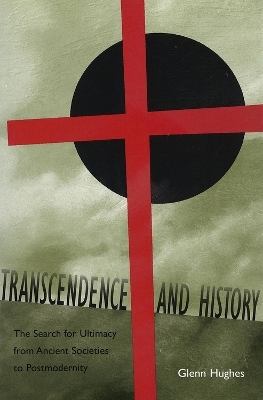
Transcendence and History
The Search for Ultimacy from Ancient Societies to Postmodernity
Seiten
2020
University of Missouri Press (Verlag)
978-0-8262-2219-0 (ISBN)
University of Missouri Press (Verlag)
978-0-8262-2219-0 (ISBN)
Provides an analysis of what philosopher Eric Voegelin described as ‘the decisive problem of philosophy’: the dilemma of the discovery of transcendent meaning and the impact of this discovery on human self-understanding.
Transcendence and History is an analysis of what philosopher Eric Voegelin described as 'the decisive problem of philosophy': the dilemma of the discovery of transcendent meaning and the impact of this discovery on human self-understanding. The explicit recognition and symbolization of transcendent meaning originally occurred in a few advanced civilizations worldwide during the first millennium. The world's major religious and wisdom traditions are built upon the recognition of transcendent meaning, and our own cultural and linguistic heritage has long since absorbed the postcosmological division of reality into the two dimensions of 'transcendence' and 'immanence.' But the last three centuries in the West have seen a growing resistance to the idea of transcendent meaning; contemporary and 'postmodern' interpretations of the human situation - both popular and intellectual - indicate a widespread eclipse of confidence in the truth of transcendence.
In Transcendence and History, Glenn Hughes contributes to the understanding of transcendent meaning and the problems associated with it and assists in the philosophical recovery of the legitimacy of the notion of transcendence. Depending primarily on the treatments of transcendence found in the writings of twentieth-century philosophers Eric Voegelin and Bernard Lonergan, Hughes explores the historical discovery of transcendent meaning and then examines what it indicates about the structure of history. Hughes's main focus, however, is on clarifying the problem of transcendence in relation to historical existence. Addressing both layreaders and scholars, Hughes applies the insights and analyses of Voegelin and Lonergan to considerable advantage.
Transcendence and History will be of particular value to those who have grappled with the notion of transcendence in the study of philosophy, comparative religion, political theory, history, philosophical anthropology, and art or poetry. By examining transcendent meaning as the key factor in the search for ultimate meaning from ancient societies to the present, the book demonstrates how 'the decisive problem of philosophy' both illuminates and presents a vital challenge to contemporary intellectual discourse.
Transcendence and History is an analysis of what philosopher Eric Voegelin described as 'the decisive problem of philosophy': the dilemma of the discovery of transcendent meaning and the impact of this discovery on human self-understanding. The explicit recognition and symbolization of transcendent meaning originally occurred in a few advanced civilizations worldwide during the first millennium. The world's major religious and wisdom traditions are built upon the recognition of transcendent meaning, and our own cultural and linguistic heritage has long since absorbed the postcosmological division of reality into the two dimensions of 'transcendence' and 'immanence.' But the last three centuries in the West have seen a growing resistance to the idea of transcendent meaning; contemporary and 'postmodern' interpretations of the human situation - both popular and intellectual - indicate a widespread eclipse of confidence in the truth of transcendence.
In Transcendence and History, Glenn Hughes contributes to the understanding of transcendent meaning and the problems associated with it and assists in the philosophical recovery of the legitimacy of the notion of transcendence. Depending primarily on the treatments of transcendence found in the writings of twentieth-century philosophers Eric Voegelin and Bernard Lonergan, Hughes explores the historical discovery of transcendent meaning and then examines what it indicates about the structure of history. Hughes's main focus, however, is on clarifying the problem of transcendence in relation to historical existence. Addressing both layreaders and scholars, Hughes applies the insights and analyses of Voegelin and Lonergan to considerable advantage.
Transcendence and History will be of particular value to those who have grappled with the notion of transcendence in the study of philosophy, comparative religion, political theory, history, philosophical anthropology, and art or poetry. By examining transcendent meaning as the key factor in the search for ultimate meaning from ancient societies to the present, the book demonstrates how 'the decisive problem of philosophy' both illuminates and presents a vital challenge to contemporary intellectual discourse.
Glenn Hughes is Professor of Philosophy at St. Mary's University at San Antonio, Texas. He is the author or editor of several books, including Mystery and Myth in the Philosophy of Eric Voegelin (University of Missouri Press).
| Erscheinungsdatum | 02.11.2020 |
|---|---|
| Reihe/Serie | The Eric Voegelin Institute Series in Political Philosophy |
| Verlagsort | Missouri |
| Sprache | englisch |
| Maße | 152 x 229 mm |
| Gewicht | 400 g |
| Themenwelt | Geisteswissenschaften ► Philosophie ► Metaphysik / Ontologie |
| Geisteswissenschaften ► Religion / Theologie | |
| ISBN-10 | 0-8262-2219-6 / 0826222196 |
| ISBN-13 | 978-0-8262-2219-0 / 9780826222190 |
| Zustand | Neuware |
| Informationen gemäß Produktsicherheitsverordnung (GPSR) | |
| Haben Sie eine Frage zum Produkt? |
Mehr entdecken
aus dem Bereich
aus dem Bereich
eine philosophische Reise
Buch | Softcover (2024)
Goldmann (Verlag)
14,00 €
Auf dem Weg zu einer postkritischen Philosophie
Buch | Softcover (2023)
Suhrkamp (Verlag)
38,00 €


